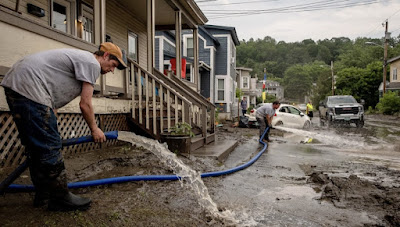US Vulnerability to Climate Crisis: Insights from the Fifth National Climate Assessment
US Vulnerability to Climate Crisis: Insights from the Fifth National Climate Assessment
A recent comprehensive report, the Fifth National Climate Assessment, issued by federal agencies highlights the pervasive and intensifying impact of a rapidly warming climate across the United States. The findings underscore the urgency of addressing continued fossil fuel usage, predicting worsening conditions within the next decade.
Despite a gradual reduction in planet-warming pollution, the pace falls significantly short of national targets and UN-mandated limits. This stark reality, as emphasized by Katharine Hayhoe, a distinguished climate scientist at Texas Tech University, underscores the pervasive influence of climate change on every facet of American life.
The report brings to light the alarming reality that no part of the US remains immune from the ramifications of climate disasters. It emphasizes the imperative of slashing fossil fuel use to mitigate these consequences. Moreover, it elucidates that every incremental rise in temperature intensifies the severity of the impact.
Attribution science, a notable advancement, now allows scientists to conclusively link climate change to intensified extreme events like heatwaves, hurricanes, and wildfires. For instance, the report cites instances like Phoenix enduring record-breaking heatwaves and devastating heat-related deaths in Maricopa County, and Vermont and Maui facing deadly floods and wildfires, respectively.
President Joe Biden's slated remarks and proposed $6 billion funding aim to fortify climate resilience by bolstering the electric grid, investing in water infrastructure, and advancing environmental justice.
The report's comprehensive insights highlight:
1. Advancements in attributing extreme events to climate change.
2. Varied regional vulnerabilities with some states facing heightened climate risks.
3. Substantial economic repercussions from climate shocks on the housing market, agriculture, and labor capacity.
4. A reduction in planet-warming pollution in the US, yet inadequate progress to meet international climate commitments.
5. Heightened water-related challenges - either extreme drought or increased flooding and sea-level rise - posing significant threats to various regions.
This assessment emphasizes the urgent need for a transformative shift in policy and action to ensure a sustainable future amidst escalating climate challenges.
Let's delve deeper into the economic implications highlighted in the report. The assessment underscores how climate shocks are inflicting increasingly frequent and severe impacts on the US economy. This trend is evident in the record-breaking number of extreme weather disasters, each costing at least $1 billion. The resultant economic fallout has been a growing concern among experts, signaling just the beginning of the financial repercussions due to the climate crisis.
The housing market is experiencing tangible effects through soaring homeowners' insurance rates and the withdrawal of insurers from high-risk states. Such actions further exacerbate economic disparities, rendering housing unaffordable or inaccessible for many.
Moreover, agriculture, a cornerstone of the American economy, is under threat. Stronger storms damaging crops and extreme heat affecting livestock have significant repercussions. These events result in food price surges, impacting consumers' purchasing power and food security.
The labor sector is not immune, with the report highlighting a potential 25% loss of physical work capacity for agricultural workers in the Southwest due to rising temperatures during peak work months.
Overall, the economic toll of climate change extends across various sectors, impacting livelihoods, financial stability, and economic growth. Addressing these challenges necessitates comprehensive strategies, robust policies, and investments in resilient infrastructure to mitigate future economic disruptions and protect vulnerable sectors from climate-related shocks.







